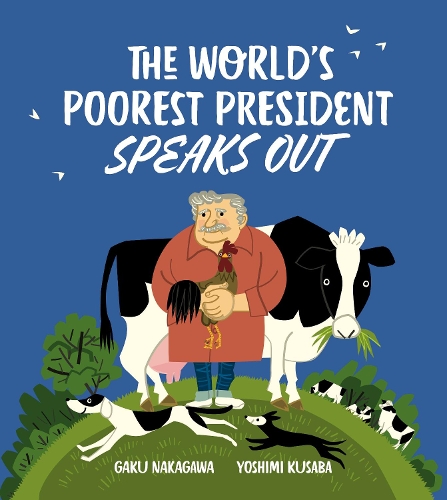
The World's Poorest President Speaks Out
(Hardback)
Publishing Details
The World's Poorest President Speaks Out
By (Author) Kusaba Yoshimi
Illustrated by Nakagawa Gaku
Translated by Andrew Wong
Enchanted Lion Books
Enchanted Lion Books
20th August 2020
3rd September 2020
United States
Classifications
Children
Fiction
989.50676092
Physical Properties
Hardback
40
Width 216mm, Height 241mm, Spine 8mm
306g
Description
It is 2012. The world's leaders gather in Brazil for a meeting, the Rio+20 Summit. They have come to discuss the future of the world, which is facing an ever worsening environmental crisis. One after another, they give speeches, but no one says anything new. As evening falls, it is the President of Uruguay's turn to speak. Jos Mujica steps up to the podium, wearing a simple shirt with no tie. He is known as "the world's poorest president." He has this name because as president, Jos Mujica donates almost all of his salary to the poor. When he was elected, he decided that he would not live in the presidential palace. Instead, he would continue to live with his wife on their farm, growing flowers and vegetables. And he would drive his trusty old car, instead of being driven in the official, presidential one. What counts for President Mujica is what needs to be done, not the appearance of things. His countrymen love him and call him Pepe, which means Grandpa. As Mujica starts to speak, no one seems especially interested in hearing from the leader of such a small country. But by the time he has finished, the room will be filled with thunderous applause.
Reviews
One of 100 Scope Notes's Most Astonishingly Unconventional Children's Books of 2020!
STARRED REVIEW! "Mujica posited that the real problem is not climate change but 'how we have come to live our lives' ... He challenged listeners to consider whether 'we were born ... to pursue economic growth and progress [or rather] to live in such a way as to find happiness on this planet.' Mujica's thought-provoking argument is just as valid today. The illustrations accompanying the text play with design and perspective, capturing Mujica's words in ways that give them great immediacy and vividness... An ideal vehicle to engage children in a discussion on the meanings of poverty, having enough, and social justice."
Nakagawas blocky digital illustrations adroitly illustrate the talks themesin one, a careworn man struggles to haul an outsize pile of possessions, including a house and car. The messagethat 'progress must add to human happiness, not take away from it'is as timely as ever. * Publishers Weekly *
This timely translation of a 2014 title originally published in Japan is based on a 2012 speech made by Uruguays 40th president, Jos Mujica, delivered at the United Nations Rio+20 Summit, held in Rio de Janeiro. Mujica, who was president from 2010 to 2015, was a simple, unassuming, and much-beloved leader... His speech on 'Sustainable Development and Human Happiness' captured his audiences attention and admiration... Bold, graphic, digitally created illustrations complement the text from the onset of the speech, where the audience appears bored, to the standing ovation at the end... VERDICT: A thought-provoking, important message for these trying times. * School Library Journal *
The word 'poor' appears in the title of exactly ONE children's book this year, and here it is. But [this book] is not unconventional for that reason alone. The text of this book is based on an actual speech delivered in 2012 by Uruguay President Jos Mujica (called the 'poorest' president because he donates 90% of his annual salary) to the United Nations Conference on Sustainable Development. His heartfelt plea 'Economic growth and progress must add to human happiness, not take away from it. -- Travis Jonker * 100 Scope Notes *
A poor person is not someone who has little, but one who needs infinitely more, and more, and more. Thus spoke Jose Mujica, then the President of Uruguay, before the United Nations in 2012. Paraphrasing the wisdom of the great thinker Seneca, he asked the world to question the dogma of consumption that has driven us into environmental and economic crisis Ably translated into English by Andrew Wong, The World's Poorest President Speaks Out is an entertaining, inspiring, and unique picture book for children ages 4-8 by the team of author Gaku Nakagawa and illustrator Yoshimi Kusaba and especially recommended for family, daycare center, preschool, elementary school, and community library collections. -- James A. Cox * Midwest Book Review *
Author Bio
Yoshimi Kusaba is an editor and the author of and contributor to several books.
Gaku Nakagawa was born in 1966 and currently resides in Kyoto. A monk of the Jodo-shu Seizan branch Zenrin-ji, he became an illustrator in 1996, creating illustrations for various books and other publications. Internationally, he has featured in Monocle, a London-based publication that is distributed across twenty countries, and also for a special feature on world illustrators by renowned German art publishers TASCHEN. Notable works include cover and book illustrations for Manabu Makines Toppinparari no kazetarou (Tokyo: Bungeishunju, 2013) and Bessatsu bungeishunjuu (Bungei shunju extra) (Tokyo: Bungeishunju, 2014). He won recognition in the 2013 Design for Asia Award for Ezoushi ryuutandan (Ezoushi Ryutandan) (2013) and Ehon kechou (Kechou) (2013).
Andrew Wong was born in Singapore, and now lives in Tokyo. He spent six years away from Tokyo in Stirling, Scotland, and Fukui, Japan, which sowed in him ideas on different ways of life. Often wandering in and out of picture books and imaginary worlds with his wife and two children, his passion to share these worlds drives a blog on stories that he hopes will one day find a worldwide audience. This book is his first published translation.
